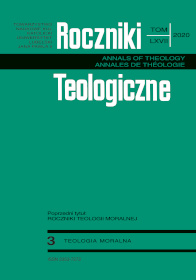Spiritual Dimension Highlighted in the Field of Health by the Profession of Spiritual Care Workers (Quebec Example)
Abstract
Many societies throughout the world, formerly deeply Christian, have become secular in recent decades. Quebec society is no exception, and the reasons for this are diverse. We can see how schools and hospitals once run by religious orders have become state property. In the past, the Catholic Church played an important role in society and took care of spiritual aspects of its people. Presently, it no longer provides these services. But this does not mean that people's spiritual needs and their thirst for transcendence have disappeared. Needs for an overall balance of life often manifest themselves in a crisis caused by illness. It is especially true in crucial moments, such as suffering, illness or closeness to death, that people ask many questions about spirituality.
A positive aspect is that Quebec's secular society respects the rights of individuals and their spiritual needs. To meet these needs, a new profession has emerged and it highlights the spiritual dimension of people. It must be taken into account by all those committed to giving support to the sick. The person as a whole “soul-body” must be at the centre during all medical care. It is for this reason that in this article I spoke firstly about the concept of the person in which the holistic and integrative approach prevails.
I then focused on the notion of spirituality. The spiritual sphere is difficult to define. By analyzing the different notions of spirituality, there are several common elements, such as seeking answers to the following questions: the identity of a human being (“who am I?”), the purpose and meaning of life (“why do I live”), the meaning of suffering and death (“Why does this happen to me?”). The problem of the meaning and purpose of life is a primordial question for man, even if it is often unexpressed. Many people find the answers to these questions in religion, in their relationship with transcendence / Supreme Being / God. Some people, however, consider spirituality in complete isolation from religion. Then, the main elements of the spiritual sphere are often relations with relatives and human values. Spiritual care workers help those suffering to regain the meaning of life, rebuild a global balance of life and/or learn to “live with” the limits. Through their profession they offer attentive listening, the possibility of dialogue, solidarity, compassion and love that the person so needs.
It is noteworthy that theological faculties and institutes of religious studies have reoriented themselves to offer programs to train spiritual care workers.
References
Barreau J.-M., Soins Palliatifs. Accompagner pour vivre, Paris, Médiaspaul 2017.
Berghmans C., Torre J.-L., Spiritualité et santé: un pont thérapeutique, „Intereditions” 2012.
Châtel T., Prise en compte du spirituel et nouvelles représentations du soin, „Médicine palliative”, n° 3, 2007, p. 196-200.
Compte-Sponville A., L'esprit de l'athéisme: introduction à la spiritualité sans dieu, Albin Michel 2006.
Fromaget M., De la distinction âme/esprit, autrement dit du ternaire humain, 2012 https:// www.unidivers.fr/de-la-distinction-ameesprit-autrement-dit-du-ternaire-humain/ (version pdf, p. 1-16).
King U., La quête spirituelle à l'heure de la mondialisation, Québec 2010.
Pepin J., Cara Ch., La réappropriation de la dimension spirituelle en sciences infirmières, „Théologiques”, vol. 9, n° 2, 2001, p. 33-46.
Potter P.A., Perry A.G., Soins infermières. Fondements généraux, vol. 1, Montréal 2009.
Puchalski C.M., Religion, Medicine and Spirituality: What We Know, What We Don't Know and What We Do, „Asian Pacific Journal of Cancer Prevention”, vol. 11, 2010: MECC Supplement, p.44-50.
Simard N., Spiritualité et santé, „Reflets”, vol. 12, n° 1, 2006, p. 107-126.
„Corpore et anima unus”: la rilevanza etica dell'unità sostanziale dell'uomo all'inizio del terzo millennio, Roma, 24 settembre 2003. http://www.caffarra.it/roma0903.php
Cherblanc, Jacques et Jobin, Guy, Soutenir le développement du pouvoir d'agir: une composante essentielle des soins spirituels au Québec, „Studies in Religion/Sciences religieuses”, pp. 1-24. Copyright © 2020 (Les auteurs). DOI: 10.1177/0008429819893655; https://const ellation.uqac.ca/5462/1/Article%20Empowerment%20ISS%5Bfinal%5D_sans%20marque.pdf (23.04.2020).
Définition: psychologie, http://www.psychomedia.qc.ca/lexique/definition/psychologie (22.04. 2020).
Juvénal, Satires, https://sites.google.com/site/texteschoisis/home/juvenal (22.04.2020).
L'histoire en citation, https://www.histoire-en-citations.fr/citations/le-xxie-siecle-sera-spirituel-ou-ne-sera-pas (16.04.2020).
Schopenhauer A., Sur le besoin métaphysique de l'humanité. https://www.schopenhauer.fr/fragments/metaphysique-et-religion.html.
Loi sur les services de santé et les services sociaux http://legisquebec.gouv.qc.ca/fr/showdoc/cs/s-4.2
Copyright (c) 2020 Roczniki Teologiczne

This work is licensed under a Creative Commons Attribution-NonCommercial-NoDerivatives 4.0 International License.





